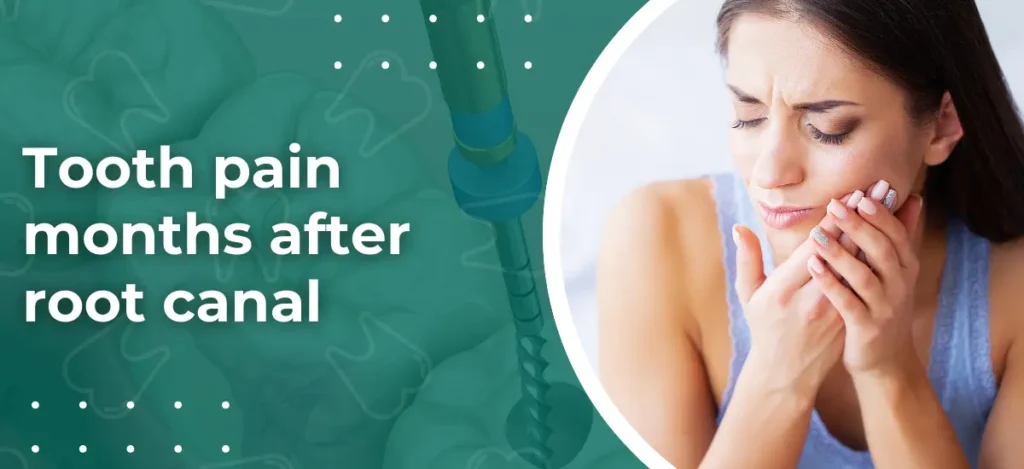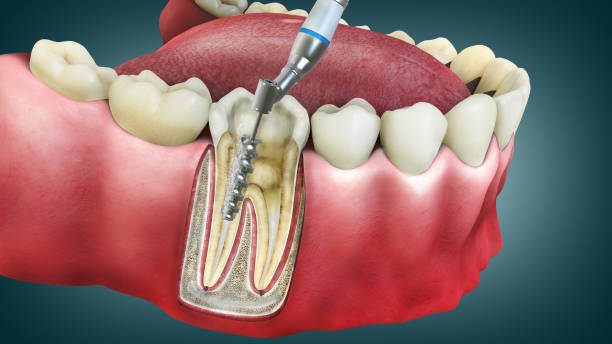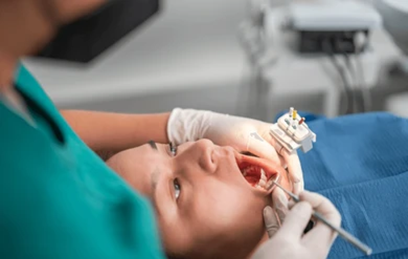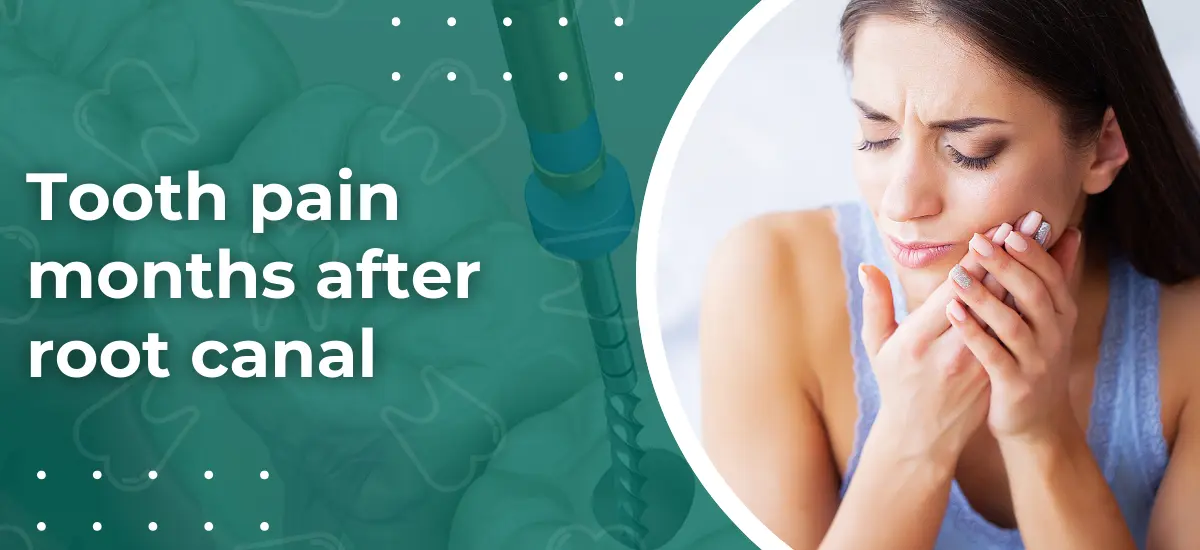
Experiencing tooth pain months after root canal can be both puzzling and frustrating. Although root canal treatments are intended to save a tooth and eliminate pain, lingering or recurring discomfort can still occur.
Understanding the potential causes of this pain is crucial for finding effective solutions. Neo Dental Care, a premier dental clinic in Noida, specializes in diagnosing and treating such post-treatment concerns with expertise.
They offer advanced dental services from cosmetic dentistry and dental implants to root canal treatment in Noida. They utilize the latest technology such as intraoral cameras, digital X-rays, and many more.
Find relief from post-root canal pain – schedule your appointment today!
Ever wondered why your tooth still aches months post-root canal? Let’s delve into the reasons!
Why is my tooth hurting months after root canal?

It is possible to experience tooth pain months after root canal for several reasons.
- One common cause is a lingering infection in the tooth root that was not fully removed during the initial treatment.
- Another reason could be a crack or fracture in the tooth, allowing bacteria to enter and cause pain.
- Poor fitted or damaged crowns can also cause irritation and pain.
- Sometimes, a tooth has more canals than initially detected. An untreated canal can harbor infection and cause throbbing pain after root canal.
- Gum infection or disease around the treated tooth can lead to pain and discomfort.
- Pain from surrounding teeth or sinuses can sometimes feel like it’s coming from the root canal-treated tooth.
- Excessive biting force, grinding, or clenching can put stress on the treated tooth, leading to pain
Dr.Suhrab Singh, an expert in root canal treatment in Noida highlights the complexity of post-root canal pain: “Persistent discomfort can stem from various issues. It’s vital to consult your dentist to identify the cause and determine the best course of action.’’
If you are experiencing persistent tooth pain after a root canal, don’t ignore it. Contact a dentist for a thorough evaluation and appropriate treatment.
Dealing with persistent throbbing pain after your root canal? Here’s how to find relief.
How to stop throbbing tooth pain months after root canal?
To stop throbbing pain after a root canal, try the following:

- Use over-the-counter pain relievers like ibuprofen or acetaminophen to alleviate pain.
- Apply a cold compress to the outside of your cheek to reduce swelling and numb the area.
- Avoid chewing on the affected side to prevent aggravating the pain.
- Maintain oral hygiene. Brush and floss gently around the area to prevent further infection.
- Rinse your mouth with warm salt water to reduce inflammation and promote healing.
- If the pain persists or worsens, contact your dentist for an evaluation and possible follow-up treatment.
These steps can help manage throbbing pain after a root canal, but it is crucial to consult your dentist for a long-lasting solution.
Worried your root canal didn’t go as planned? Look out for these signs of an unsuccessful treatment.
What are the symptoms of a failed root canal?

A failed root canal may often lead to tooth pain months after the root canal procedure. Make sure to consult a dentist if any symptoms appear.
Symptoms of a failed root canal include:
- Pain or discomfort that persists or returns months after the root canal procedure.
- Swelling in the gums or face around the treated tooth.
- Discomfort when biting or applying pressure to the tooth.
- Sensitivity to hot or cold temperatures.
- Signs of infection such as drainage, pus formation, or a pimple-like bump on the gums near the treated tooth.
- Discoloration or darkening of the tooth.
If you are experiencing any of these symptoms after a root canal, seek professional help. Visit a dental clinic for expert advice and treatment options tailored to your needs.
Let’s find out the treatment options for lingering toothache post-root canal.
Treatment Options for Post-Root Canal Pain

Here are some treatments your dentist might recommend if you are experiencing tooth pain months after root canal:
- Medication: If an infection is the cause of pain, then your dentist may prescribe antibiotics to eliminate the bacteria causing the infection.
- Root Canal Retreatment: If the initial root canal was unsuccessful, retreatment might be necessary. This involves reopening the tooth, cleaning the infection, and resealing it.
- Crown Replacement: If the crown is damaged or improperly fitted, replacing it can resolve discomfort and protect the tooth.
- Treating Gum Disease: If gum disease contributes to the pain, your dentist may recommend deep cleaning procedures like scaling and root planing to remove plaque and tartar buildup.
- Fixing Cracked Teeth: If there is a crack in the treated tooth, your dentist can repair it with bonding materials or place a new crown to stabilize it.
Conclusion
Persistent tooth pain months after a root canal can be a sign of underlying issues that require prompt attention.
It is essential not to ignore this discomfort and seek the expertise of a dental professional.
Neo Dental Care, an ultra-modern dental clinic in Noida offers all kinds of dental services to help you find relief and maintain optimal oral health.
CTA: Don’t let tooth pain disrupt your life any longer – schedule an appointment today and take the first step towards a pain-free smile.
FAQs
Can a root canal get infected months later?
Yes, a root canal can get infected months later due to reasons such as residual infection, new decay, cracks in the tooth, or untreated canals.
Can a dentist fix a failed root canal?
It is possible to fix a failed root canal through a retreatment where the tooth is reopened and cleaned out again. The dentist may also replace a damaged crown or address cracks in the tooth.
Can you heal a root canal naturally?
No, you cannot heal a root canal naturally. A root canal requires professional dental treatment to remove infected tissue and prevent further infection.
What happens if you ignore a failed root canal?
Ignoring a failed root canal can lead to serious complications, including:
- Persistent Pain
- Spread of infection
- Abscess Formation
- Tooth Loss
References:
https://www.ncbi.nlm.nih.gov/pmc/articles/PMC4784145/https://www.medicalnewstoday.com/articles/320978

